Okra is a popular vegetable known for its unique taste and slimy texture and has become a point of focus for many dog owners. Many dog owners want to know “Can dogs eat Cooked Okra?” The short answer is yes, cooked okra is safe for dogs and provides many health benefits to them.
In this detailed guide, we will be sharing with you the benefits, some potential health risks, and health concerns associated with feeding cooked okra to dogs.
So let’s get into the article without any further delay!
Understanding Cooked Okra
Cooked okra is a dish that is prepared by undergoing heat and being cooked by many different methods. Okra is also known as lady’s finger, and it is a vegetable that is commonly consumed in many cultures around the world.
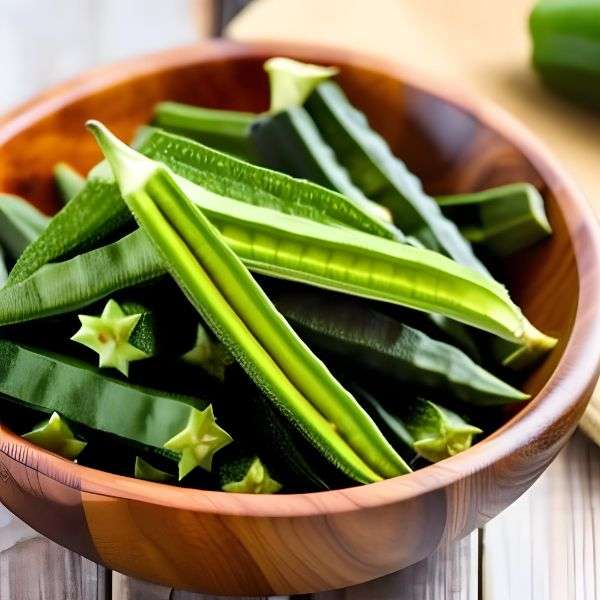
It is known for its distinctive long shape, vibrant green color, and characteristic slimy texture when cooked.
The are different methods for cooking okra such as boiling, steaming, sautéing, or grilling. These cooking methods make the okra soft and easy to eat.
Cooking okra can enhance its taste and make it more delicious. It is often used in various dishes such as stews, soups, stir-fries, and even as a side vegetable.
Nutritional Composition of Cooked Okra
Below is a table highlighting the nutritional composition of cooked okra:
| Nutrient | Amount per 1 Cup (Cooked Okra) |
|---|---|
| Protein | 1.91 grams |
| Total Lipid (Fat) | 0.28 grams |
| Calories | 37.8 |
| Carbohydrates | 7.77 grams |
| Fiber | 3.2 grams |
| Sugars | 1.88 grams |
| Calcium | 99.2 milligrams |
| Iron | 0.62 milligrams |
| Magnesium | 57.6 milligrams |
| Phosphorus | 52.8 milligrams |
| Potassium | 257 milligrams |
| Sodium | 8 milligrams |
| Vitamin C | 13.04 milligrams |
| Vitamin A | 362 International Units (IU) |
| Vitamin K | 53.6 micrograms |
This table provides a snapshot of the key nutritional components found in one cup of cooked okra.
Can Dogs Eat Cooked Okra?
Yes, dogs can eat cooked okra without any health issues. It can be a healthy addition to their food because it has important nutrients like fiber, vitamins, and minerals.
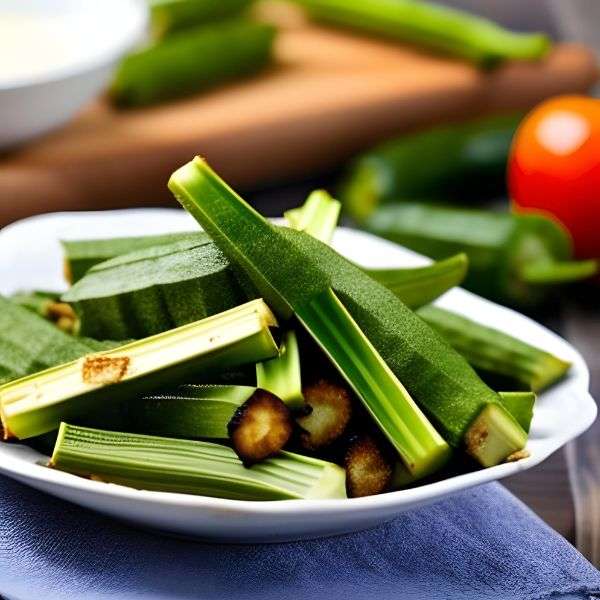
But it’s important to not give them too much-cooked okra, and it should be plain without any spices or oils that can hurt them.
Whenever you want to introduce new food to your dog, it’s a good idea to start with a little bit and see how they react to it.
Health Benefits of Cooked Okra for Dogs
Cooked okra can offer several potential health benefits for dogs when incorporated into their diet. Here are some key health benefits of cooked okra:
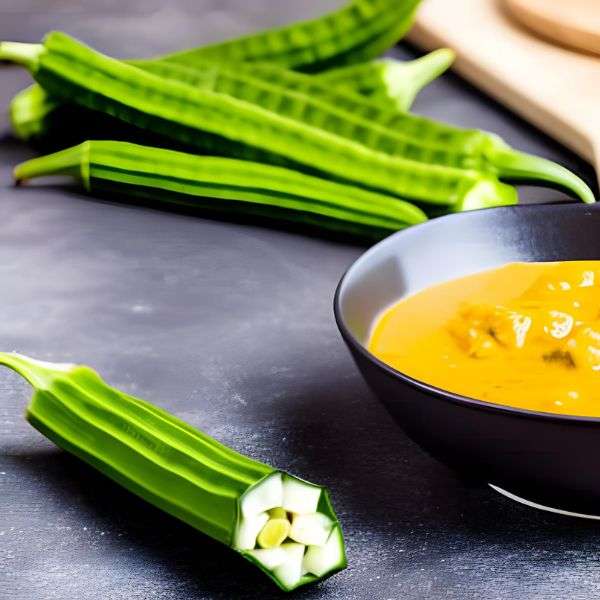
Digestive Health:
Cooked okra has a lot of fiber, which is good for your dog’s digestion. It helps make sure they have regular poops and keeps their tummy healthy. It can also stop them from getting constipated and keep their gut in good shape.
Nutrient Boost:
When you cook okra, it has a lot of vitamins, minerals, and antioxidants that are good for your dog’s health. These nutrients, like vitamin C, vitamin A, potassium, and calcium, help their body work properly and keep them healthy. They do important things for their body and make sure everything is working well.
Joint Support:
Cooked Okra has some special nutrients in it that might help dogs with joint problems or arthritis. Eating cooked okra regularly could help make the swelling in their joints go down and give them some relief. It also helps keep their joints healthy.
Hydration Assistance:
Okra has a lot of water in it, which can help your dog stay hydrated. This is especially good during hot weather or if your dog doesn’t drink enough water normally.
Remember, even though cooked okra can be good for your dog’s health, it’s not enough to be their only food. They still need a balanced and complete diet to stay healthy.
Potential Risks Associated with Cooked Okra for Dogs Health
While cooked okra can provide health benefits to dogs, it’s important to be aware of some potential risks and considerations associated with its consumption. Here are some of them:
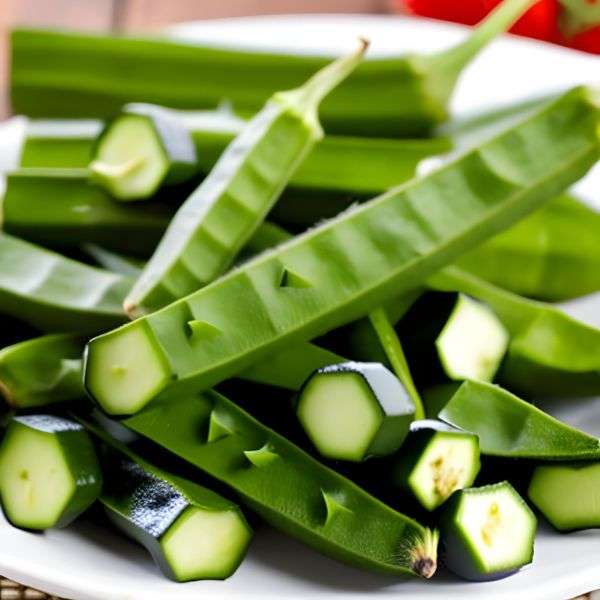
Allergies:
Sometimes, dogs can get allergies to certain foods, like okra. When you give your dog cooked okra for the first time, it’s important to watch them closely.
Check for any signs like itching, swelling, upset tummy, or trouble breathing. If you see any of these things, stop giving them okra and talk to a vet.
Choking Hazard:
Okra can have tough parts that might make your dog choke, especially if it’s not prepared well. Before giving your dog cooked okra, make sure to take out any hard stems or big seeds.
This will make it safer to eat and reduce the chance of them getting choked or having problems in their tummy.
Digestive Upset:
Some dogs may not like the slimy feeling of okra and it could upset their tummy. They might have runny poops or feel sick after eating cooked okra.
It’s a good idea to start with a little bit and see how they handle it. Watch how they react to make sure it doesn’t bother them.
Seasonings and Oils:
When you cook okra for your dog, don’t add any spices, oils, or extra things that can be bad for them. Some spices like garlic or onion powder, can make dogs sick. Give your dog plain cooked okra to keep them safe.
Individual Sensitivities:
Every dog is different, and they can react differently to different foods. While most dogs can eat cooked okra without problems, some dogs might have sensitivities or not tolerate it well.
How to Add Cooked Okra to Dogs Diet?
When adding cooked okra to your dog’s diet, it’s important to follow these guidelines for safe and healthy incorporation:
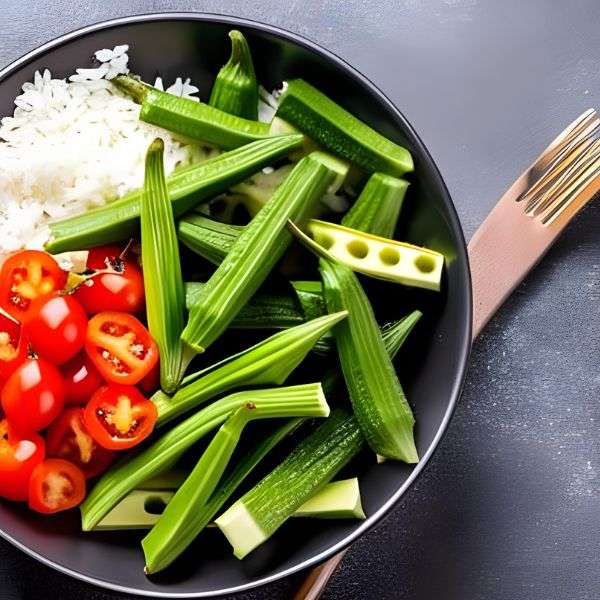
Introduce Gradually: When you want to give your dog cooked okra, start by giving them a little bit at a time. Begin with a few small pieces and watch how your dog reacts for a few days.
Prepare Plain Okra: When you cook okra for your dog, make sure it’s plain and doesn’t have any extra things added to it. Avoid using salt, spices, or cooking oils that can be bad for dogs. The easiest and safest way to cook okra for your dog is to steam or boil it without adding anything else.
Cut into Dog-Friendly Portions: Cut the cooked okra into pieces that are suitable for your dog’s size. For smaller dogs, make smaller, bite-sized pieces, while larger dogs can handle slightly bigger pieces. This helps prevent choking and makes it easier for them to digest.
Mix with Regular Food: Add cooked okra to your dog’s regular meals. You can mix it with their normal dog food or use it as a topping.
Portion Control: Be careful with how much-cooked okra you give your dog. Even though it’s healthy, it’s important not to give too much and disrupt their diet. Think about your dog’s size, weight, and what they need when deciding how much to give them. It’s better to give the right amount.
Monitor Your Dog’s Response: After you start giving your dog cooked okra, watch how they act and see if they eat well and stay healthy. Keep an eye out for any signs of allergies, problems with digestion, or changes in their poop. If you notice anything worrying, stop giving them okra and talk to your vet for advice.
Alternatives to Cooked Okra
If cooked okra isn’t suitable for your dog or you’re looking to provide some variety in their diet, here are some alternative vegetables that can be beneficial and safe for dogs:
Carrots:
Dogs really like carrots, and they’re good for them too! Carrots don’t have too many calories, but they do have a lot of fiber and important vitamins like vitamin A and vitamin K. You can give dogs carrots either raw or cooked, so there are different ways to serve them.
Green Beans:
They don’t have too many calories and have a lot of fiber, which dogs like because they’re crunchy.
Green beans also have important vitamins and minerals like vitamin C and manganese. Just follow the same guidelines as before.
Sweet Potatoes:
Sweet potatoes are a healthy vegetable that dogs like to eat. They have lots of good things like fiber, vitamins A and C, and potassium. You can cook sweet potatoes by baking, boiling, or steaming them for your dog.
Pumpkin:
Pumpkin is good for dogs’ digestion and is known to be helpful. It has a lot of fiber that can keep their poops regular. Pumpkin also has vitamins A, C, and E, and potassium. You can give your dog plain, cooked pumpkin without any added sugars or spices.
Broccoli:
Broccoli can be good for dogs if you give it in the right amount. It has fiber, vitamin C, and other good stuff. When you give your dog broccoli, make sure to cut it into small pieces and remove the tough stems.
Peas:
Peas have fiber, vitamins A and C, and minerals like potassium. You can give dogs fresh, cooked, or even frozen peas as a cool treat on hot days.
FAQS
Can I feed raw okra to my dog instead of cooked okra?
Raw okra can be hard for dogs to digest because it’s tough. Cooking okra makes it easier for dogs to digest and get nutrients. It’s better to give them cooked okra instead of raw.
How much-cooked okra can I give my dog?
Start with small portions of cooked okra and see how your dog reacts. Consult with your vet to know how much is right for your dog based on their size, weight, and diet.
Are there any risks of feeding cooked okra to dogs?
Be careful with cooked okra to avoid choking, allergies, or tummy problems. Watch your dog while they eat and make sure the pieces are small and safe.
Can cooked okra help with my dog’s constipation?
Cooked okra’s fiber can help with constipation, but check with your vet to understand the cause of constipation and if okra is suitable for your dog.
Can cooked okra be given to puppies?
Puppies can have a bit of cooked okra as they start eating solid food, but ask your vet to make sure it fits their diet and needs.
Can dogs with specific health conditions, such as diabetes or kidney disease, eat cooked okra?
Dogs with specific health conditions may require a specialized diet. It is best to consult with your veterinarian to determine if cooked okra is suitable for your dog’s specific health condition and dietary requirements.
Conclusion
In conclusion, cooked okra can be a good source of nutrition for dogs. Fortunately, the answer to the question is a big YES!
Cooked okra can be very beneficial for dogs’ health as it offers many types of vitamins and minerals and also provides good nutrition for your dog.
By following the above guidelines you can safely feed this tasty meal to your dog and keep your dog healthy and fit.
Happy Snacking!
